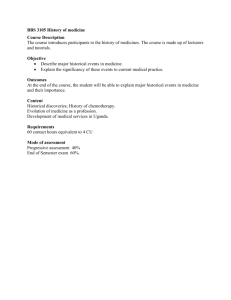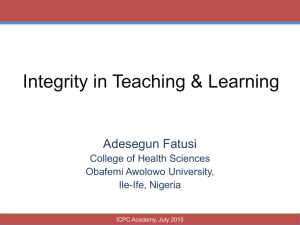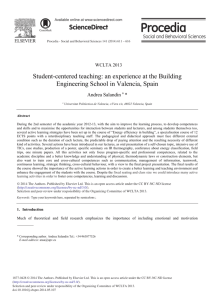Development of research skills in teacher education
advertisement
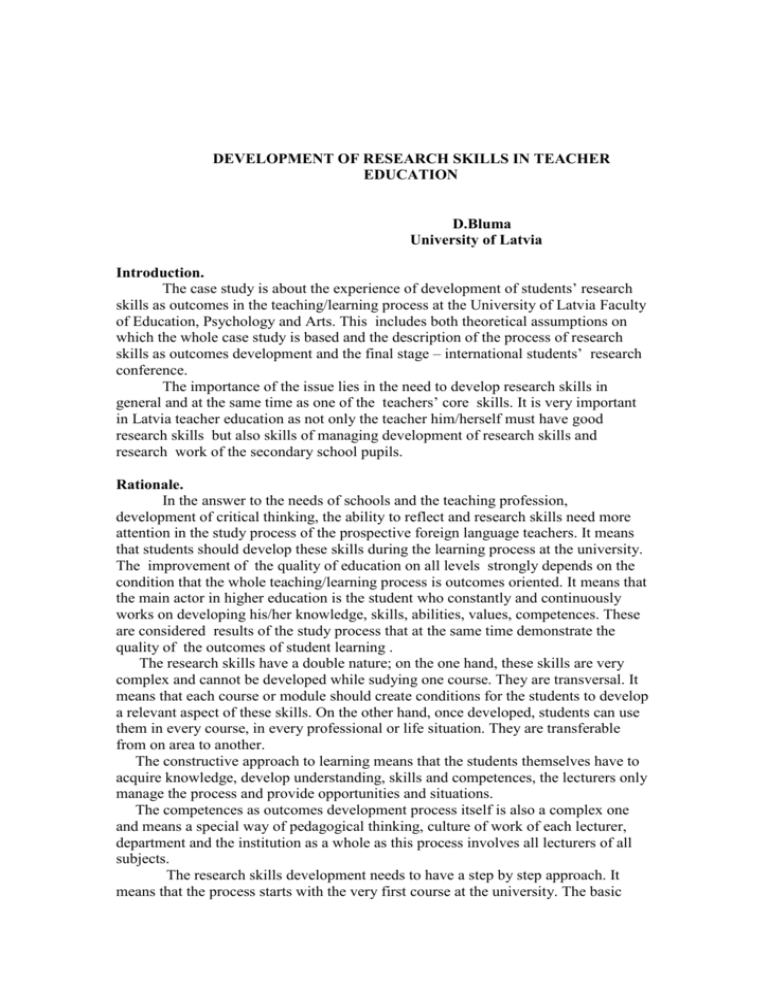
DEVELOPMENT OF RESEARCH SKILLS IN TEACHER EDUCATION D.Bluma University of Latvia Introduction. The case study is about the experience of development of students’ research skills as outcomes in the teaching/learning process at the University of Latvia Faculty of Education, Psychology and Arts. This includes both theoretical assumptions on which the whole case study is based and the description of the process of research skills as outcomes development and the final stage – international students’ research conference. The importance of the issue lies in the need to develop research skills in general and at the same time as one of the teachers’ core skills. It is very important in Latvia teacher education as not only the teacher him/herself must have good research skills but also skills of managing development of research skills and research work of the secondary school pupils. Rationale. In the answer to the needs of schools and the teaching profession, development of critical thinking, the ability to reflect and research skills need more attention in the study process of the prospective foreign language teachers. It means that students should develop these skills during the learning process at the university. The improvement of the quality of education on all levels strongly depends on the condition that the whole teaching/learning process is outcomes oriented. It means that the main actor in higher education is the student who constantly and continuously works on developing his/her knowledge, skills, abilities, values, competences. These are considered results of the study process that at the same time demonstrate the quality of the outcomes of student learning . The research skills have a double nature; on the one hand, these skills are very complex and cannot be developed while sudying one course. They are transversal. It means that each course or module should create conditions for the students to develop a relevant aspect of these skills. On the other hand, once developed, students can use them in every course, in every professional or life situation. They are transferable from on area to another. The constructive approach to learning means that the students themselves have to acquire knowledge, develop understanding, skills and competences, the lecturers only manage the process and provide opportunities and situations. The competences as outcomes development process itself is also a complex one and means a special way of pedagogical thinking, culture of work of each lecturer, department and the institution as a whole as this process involves all lecturers of all subjects. The research skills development needs to have a step by step approach. It means that the process starts with the very first course at the university. The basic principle is beginning from the simpler aspects and then gradually adding the more complicated aspects. E.g. during conversation classes, writing, grammar etc. students start with comparing, reflection, evaluation, problem solving exercises. But when finishing studies students can demonstrate their presentation and academic writing skills, oral presenation skills, writing their graduation paper that contains real research from heir teaching practice. On the one hand research skills can be developed in each course be it linguistics, stylistics, development of language skills, approaches and methods of teaching,modern information technologies. On the other hand these skills demonstrate their interdisciplinary character in the teaching practice when students need to see their pupils needs, find the best solution, understand their own teaching and pupils’ learning. The process of development of research skills is continuous and the lecturers need common understanding of the necessity and their role. The development of these skills being both horizontal or linear from course to course in the same study year and vertical continuing from one year to the next one the success depends on the closeness of collaboration of all lecturers involved in the programme. At the same time the most significant key word for the content and the process of reseach skills development is balance between theory and practice. Core research skills of the teacher of foreign languages The elements of research skills may seem simple but at the same time they demand focuss on changing teaching/learning approaches and letting students take over the activity and action. It is obvious that every course can make a contribution according to its nature and logics. The students research skills include the following abilities: - to understand the need and essence of research skills in teaching profession, the use of various research methods for academic and classroom research; - to find and select literature, situations where research skills are needed; - to analyse various sources on a topic, to interpret various approaches, views, theories; - to evaluate peer presentations and outcomes; - to interpret various approaches, views, theories. These activities are more complex.The more so because students as prospective teachers need not only a high level of foreign language skills but also presentation skills. Accordingly, students should learn skills: - to apply interdisciplinary approach in solving problems from classroom practice; - to use various research methods in practice, such as observation, case study, content analysis, interviews, questionnaires; - to communicate about their findings to pupils, parents, colleagues; to comjunicate with colleagues from other countries; - to present the results ; - to write academically – shorter and longer presentations, reports, graduation paper. There is a developed consecutive system in foreign language teacher education in the University of Latvia Faculty of educaton, psychology and arts from the 1st to the last semester how students can develop their research skills at every course. Practical opportunities in each course are supported by special courses such as academic writing, organization of research in pedagogical work, writing of course papers and the final diploma paper. The Conference The answer to the question why international conference should be included as one of the final stages of research skills development is as follows: Nowadays a teacher of foreign languages has a very important role, place and functions in international cooperation in education not only at an individual level, but also school and national level. The more so, that teachers need a special approach to the devlopment and use of these skills, i. e., in everyday situations and have to demonstrate them in continuos communication with colleagues, pupils, parents. Therefore students’ research conference was introduced 7 years ago and now is an annual conference as a logical part of the system of the research skillls development.The introduction of the international conference was possible due to several previous experiences: - there is good synergy among lecturers as all of them have research experiences and also experiences of participation in various international projects; - students are active in international mobilities and Comenius teaching assistance programme it is not enough to develop a high level of research skills and opportunities need to be provided also outside regular classes closer to real life situations. - there is a strong link of teaching foreign languages to intercultural aspects and the need to communicate in international settings. Practically all students are involved in the various sections of the conference: they present the results of their research during their teaching practice, they participate in the discussions, ask questions, solve problems, demonstrate their abilities. Students acquire also organizational skills. As it is an international conference the students have many opportunities to work starting with invitation and planning, welcoming and catering, being together in the conference and after the official activities, in other words, being responsible from beginning to end. This year there were students and staff from 9 European countries. After the conference an important stage is the reflection on the conference strengths and weakneses and making suggestions for changes in the next years conference. The feedback activities involve students and lecturers. It includes per review, discussions, group work, project work on the conference planning for the next year, written reviews. The added value of participating in the conference is the experience of being in international community, development of intercultural communication, learning through doing in authentic situations.
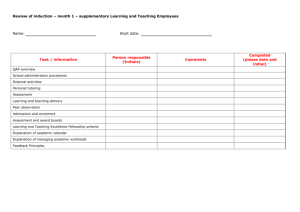

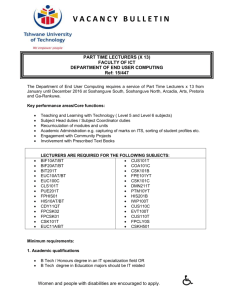

![afl_mat[1]](http://s2.studylib.net/store/data/005387843_1-8371eaaba182de7da429cb4369cd28fc-300x300.png)

